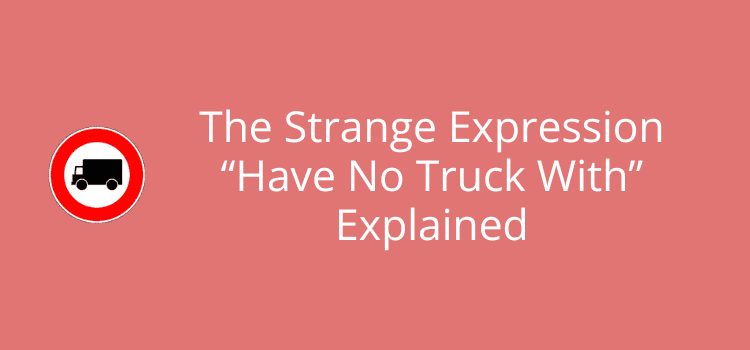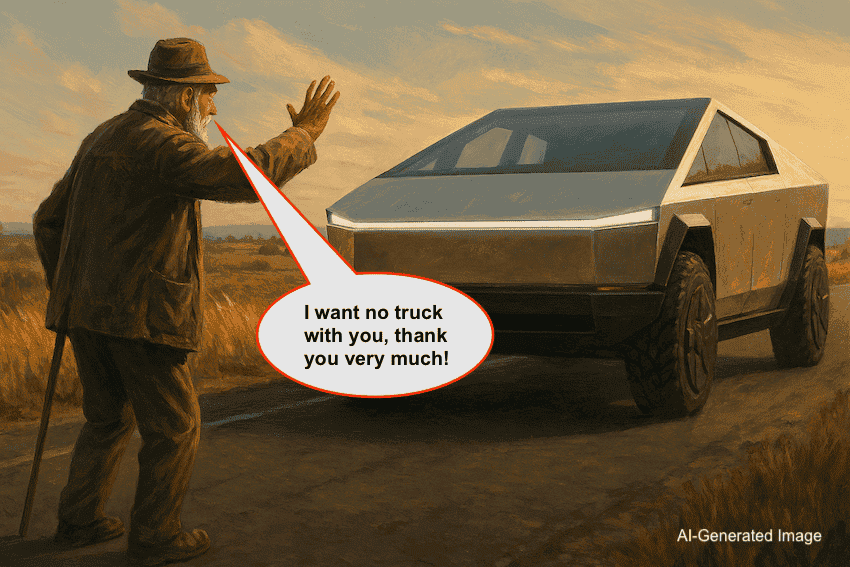
Why will I have no truck with trucks or even lorries?
It’s not that I have anything against trucks, even though I don’t wish to own one.
What’s hiding behind this odd idiom is a meaning that most people have forgotten. And it has nothing to do with powerful motors, wheels, or horsepower.
The origin of the phrase “no truck with” is about barter, exchange, or simply refusing to be involved.
Having no truck with truckers? Not quite.

Before I get distracted with pickup trucks, lorries, or even Cybertrucks, I want to take you back in time to a few centuries past.
The word truck we use in idioms and sayings had nothing to do with engines, wheels, or highways back then. Well, they had wheels, but that was all.
In Middle English, the verb and noun truck described barter, trade, and other types of dealings.
In everyday use, people would talk about having truck with someone for business or exchanges. So, to have no truck meant refusing to be involved in these types of affairs.
Over time, this old sense of the word truck gradually disappeared, to be replaced by the association with heavy vehicles.
However, the idiom sense survived, frozen in time and keeping that older meaning alive.
In Mark Twain’s Huckleberry Finn, Huck Finn says, “He didn’t hold no truck with the likes of me.” With the sentence, he is saying that the person had no dealings with him.
Sir Arthur Conan Doyle used it in The Sign of the Four: “But I tell you now that if it is anything against the safety of the fort I will have no truck with it, so you can drive home your knife and welcome.”
It’s not unusual to come across forms of the phrase like, “I’ll have no truck with such nonsense,” or “I will have no truck with a man who can forget his mother.”
Most readers encounter the phrase today without realizing its original meaning. It’s a gentle reminder that sometimes even the simplest of words can carry centuries of history.
A word that once meant trade
The history of the word “truck” started long before trucks rolled down our busy highways.
The word comes from Middle English, which was borrowed from Old North French troque, meaning barter or exchange.
It was used to describe any kind of trade or business relationship, whether it was goods, services, or favors.
People probably “trucked” with merchants, neighbors, or even friends, meaning they engaged in some sort of business or dealings.
Both the noun and verb existed in use at the time. You could “truck with” someone, or discuss your “truck” with them.
The set phrase that we still use, “no truck with,” developed as the negative form as a way to say one refuses to be involved or associated.
It carried quite some weight, too. To “have no truck” with someone was a strong statement of disapproval in times past.
Writers of the time used the phrase in religious and political contexts to show disapproval.
But as society and language evolved, other words and expressions replaced the everyday commercial sense of truck.
Then, with the rise of the automobile in the late 19th century and its dominance in the 20th century, truck became firmly associated with heavy transport.
The older sense of barter and dealings then started to disappear from writing and everyday use.
But idioms are very stubborn creatures, and this archaic meaning of “have no truck” has survived as a fossil of the word’s original meaning.
You might still come across the phrase occasionally in literature or journalism and wonder what truck means.
But by understanding the history, it helps you read these archaic idioms better, and appreciate how even the simplest of words can come from a surprising past.
How truck and other words got stuck in idioms
Idioms are a little bit like linguistic time capsules.
They help preserve old or archaic words long after they have disappeared from everyday use. The phrase “to have no truck with” is a perfect example.
Even though almost no one today uses truck to mean trade or dealings, the saying lingers on, unchanged.
It’s frozen in our language, carried forward while the world has changed around it.
This happens more often than you might expect. English is full of words that hang on because set phrases keep them alive.
Take fro, for example. You would never hear it on its own, but in the phrase “to and fro,” it survives to convey “back and forth.”
Others include “beck and call” and “by dint of.”
Or wreak. Few people would say they are about to wreak anything, but everyone understands wreak havoc. The verb itself has almost vanished, but the phrase remains in popular use.
The same is true of tenterhooks and knell. Outside church history or poetry, you rarely see it, yet death knell still appears in modern writing.
In each of these cases, the phrase acts like a museum display, with an old word preserved inside. It’s visible and meaningful, but no longer part of daily vocabulary.
Truck belongs firmly in this family of stuck words. We no longer truck goods with our neighbors, but the fossilized saying ensures its older meaning still rolls along.
That is one of the reasons idioms are so valuable. They give us a glimpse of the past and show how words evolve, shift, and sometimes almost disappear.
In their own way, idioms are little history lessons, especially for writers. And it’s a history you can help keep alive.
Summary
I’m always fascinated by words that seem forgotten, but pop up from time to time to remind us that they still exist. It’s as if they refuse to give up.
Expressions such as “have no truck with” remind us of older meanings, but we can still find modern uses, especially in writing.
It’s one of the fascinating parts of writing: discovering uses for words that might surprise your readers.
So the next time you are tackling a business, dealing, or barter topic, the word “truck” is a useful one to have in your vocabulary toolbox.
And as a final thought, maybe, just maybe, the old expression “keep on trucking” might have a double meaning.
I’ll leave that up to you to decide.
Related Reading: Hunger Pangs Or Hunger Pains – Which One Is Correct?
Share This Article


